- Home
- Don DeLillo
The Names Page 17
The Names Read online
Page 17
“He has this sentimental idea. I’m part Jewish somewhere back on my mother’s side and he expects me to think I’m coming home. I’m an idiot because I don’t explore my background, I don’t pay more attention to the Jewish ruins. I come mostly from the Midwest. We moved a lot. We lived in a trailer court when I was little. I got into trouble a lot, I ran away two or three times, I went sort of crazy in the Haight. I was way too young to know what was going on. Frank says if it wasn’t for the Jewish underpinning I’d be a total Oklahoma drifter. He’s stupid about that. I’d be a motorcycle moll, a dancer in a lounge. Everything between the coasts is Oklahoma to him. Big, dusty, lonesome.”
“He makes movies there.”
“He makes movies. I love his movies. See, on one level he’s fascinated by the pure American thing. The aimlessness, the drifting. That’s fascinating to him, it lends itself somehow. Motels, mobile homes, whatever. But he’d dump me in a minute if I’d never mentioned being part Jewish. Now that’s worthwhile. That’s something to respect yourself for. A Jew.”
Frank had nothing to say until we were across the river, sitting under the corrugated roof in the Jordanian area, past the gun emplacements, waiting for our original driver to show up.
“Do we have to go to Amman?”
The question was addressed to himself, if anyone. He wore dark glasses and kept biting skin from the edge of his thumb. The driver appeared, in jeans and elevated heels, extending his pack of cigarettes.
Amman is set on seven hills. ln Arabic the word for hill or mountain is jebel. When we were fifteen minutes outside the city I told the driver to take us to Jebel Amman, where the Inter-Continental is located. I would pick up the suitcase I’d left there and then go with Frank and Del to the airport, where I’d catch my plane to Athens, they’d catch theirs to Aqaba, a thirty-minute flight.
“Do we have to go to Aqaba?” Del said.
Most of their clothes were there, two cameras were there, a tape recorder and other equipment in two suitcases and a canvas bag. Five minutes later Volterra spoke for the second time.
“I have it all figured out. Once this collapses. Once the entire career goes down the tubes. I know exactly what I’ll do for the rest of my life. I’ve been planning it since the very beginning. Because I’ve always known. I’ve known since the beginning, I’ve been planning since the beginning. Once the dust clears from the last failure. Once they’ve stopped talking about me in the tones they reserve for the once promising beginners who overextended, who burned out, who miscalculated, who didn’t deliver, who ran out of luck. The tone of tepid regret, you know? The knowing tone that says those early successes were obviously accidents anyway. I know where I’ll go when this happens, what I’ll do.” He dropped his hand from the side of his mouth. “I’ll open a same-day dry-cleaning service. With the money I haven’t pissed away on exploring the world for subjects, I’ll go to a quiet place somewhere, one of those well-planned communities with crescent streets and picturesque lampposts, a series of town-house developments although there’s no town, they’ve forgotten the town. A modest place. Elderly couples. Divorced women with anxious kids. Unassuming. My same-day dry-cleaning store will be in the shopping mall along with the boutique, the supermarket, the radio and TV repair, the three-in-one movie theater, the fast-food places, the travel agent, all of it. It’s a community where no one knows the names of film directors. People just go to the movies, you know? That’s where I’ll hide out for the rest of my life. Frank’s Same Day Dry Cleaning. The fucking clothes’ll come whipping along on these huge fucking conveyors, a thousand pairs of tartan slacks, a thousand tennis dresses, all wrapped in shimmering plastic. You want your tartan slacks, all I do is press a button behind the counter and these serpentine conveyors go into motion, shooting the garment toward the desk in twisty looping figures. Pink sales slips flutter from the moving garments. The plastic rustles, it clings. It clings to everything—clothes, car seats, metal, human flesh. I’m behind the counter, happy to be there. People call me Frank, I call them Mr. Mitchell, Mrs. Green. ‘Hi, Mr. Mitchell, think we got that piña colada stain off your tartan slacks.’ I live in the back of the shop. I have a hotplate, a little Sony TV, my pornographic magazines, my wheat germ and honey shampoo, the one luxury in my life, because I fear baldness more than death. But there is one person who knows my identity, who has managed to find out. An ex-New Yorker, what else? A film society pervert who recognizes me from old photos in his collection of film journals. Word gets around. People start saying, ‘He was famous for ten minutes in the seventies.’ ‘Who was he?’ ‘An actor, a gangster, I forget.’ They forget. In the end they forget even the erroneous things they’ve been told about me. How beautiful. It’s why I’m there, after all.”
At the Inter-Con I found out my flight had been delayed for five or six hours. I went out to the car and stuck my head in the window. He sat with one arm around her, still in his dark glasses, his army surplus jacket, unshaven. Del seemed to be asleep.
“Come to Athens,” I said.
“I don’t know.”
“What other possibilities?”
“I have to think about it. California maybe. Do nothing for a while.”
“They know you in California. Come to Athens. I have a spare bedroom.”
“I don’t know, Jim.”
“What about the cult?”
“I have to think about it.”
“You’re crazy,” I said. “Forget it.”
He looked straight ahead, his hand curled over her shoulder, and he spoke quietly in a tone that found fault with me for dealing in self-evident things.
“Don’t tell me I’m crazy. I fucking know I’m crazy. Tell me I’m a little brave, a little determined. I want to hear someone say I follow things to the end.”
When they were gone I went back to the desk, got the map out of my overnight bag and headed out into the city. From the spaces and heights of Jebel Amman it was a long walk down to the crowds around the taxi ranks near the Roman theater. The sun was warm. Men folded their robes under them, climbing into the shared cabs. I went past the columns and walked slowly up to the top of the theater. On the far side two men sat several rows apart, reading newspapers. No one else was here. The stone ran sandy white, curves lengthening in the climb. I sat one row down from the top. Traffic was a remote noise, another city. I felt solitude begin to return, a sense of elements gathering, first things. A long time passed. This theater, open to the city, was at the same time detached from it, a mental space, a park made of nothing but steps. Perfect. My mind was clear. I felt empty, alert. I took out the map and unfolded it. One of the men on the second tier unfolded his newspaper to turn a page. On the reverse side of the map of Jordan was a detailed map of Amman. I looked for a way back to the hotel that would not involve retracing my route. But I found something else. Something came to me. I didn’t have to concentrate or direct my thoughts. As if I’d known all along. As if my interrupted sleep of the night before had been a mechanism of clarifying thought. Initials, names, places. In the emptiness of these moments, in the reason and ease of these sweeping curves, I realized I’d been approaching this point all morning long. I folded the map and put it back in my jacket pocket. One of the men, the higher of the two, got to his feet and walked slowly down the steps. Soft noise from the distant city.
Jebel Amman / James Axton.
7
I met her in a café in Kolonaki Square, a place where all Athenians who feel they are worth seeing eventually show up to be seen, where the women have pouty ultraviolet mouths, the uniform is leather, the chains are gold, the futuristic object parked at the corner is a De Tomaso Pantera, the command car of idle fantasy, and the slender bearded men shift in their chairs, behind dark glasses, wearing sweaters draped over their shoulders.
Ann, approaching, tilted her head to catch my eye. The warm smile held an edge of reproof.
“Where have you been? Said she accusingly.”
“Making the rounds. The G
ulf and points north. Many wonders.”
“You might have mentioned it, you beast.”
“It was chaos, honest. I had barely enough time to arrange visas.”
“You wanted us to worry,” she said.
“Ridiculous.”
“You wanted us to think you’d simply run off, run away, given it all up, given us up.”
“Did you call my secretary?”
“Charlie did.”
“Then you knew.”
“Eventually,” she said, using the word to indicate I was taking this more seriously than I was supposed to.
The main cafés and their auxiliaries were crowded into a noisy slanted space that included a small park, traffic melees, three or four kiosks layered and seamed in bright magazines. The first mild day after a grim spell. The canopies were furled to let in light, the tables extended across the sidewalks. Celebration and release. An old woman turned the crank of a barrel organ while her husband moved among the tables collecting coins. People had the happy air of survivors eager to talk of their common ordeal. Waiters moved sideways. The lottery man stood at the edge of things, bearing his notched stave.
“How nice to be back,” I said. “I want to do nothing, go nowhere. A sunny winter. That’s what I want. Orange trees on every street. Women in self-important boots.”
“Wait until the wind starts blowing. You’re high enough on Lycabettus to get the full effect.”
“I want to pass time. Sit in places like this, talk about nothing.”
“I have to confess I find it hard to pass time in the heart of the city. I need a seascape or vista.”
“I could easily fall into this,” I said. “Laze my way through life. Coffee here, wine there. You can channel significant things into the commonplace. Or you can avoid them completely.”
“I wouldn’t have thought you were a café wastrel.”
“We all are. It’s just a matter of realizing it. I’m preparing myself for the bleak years ahead. A lonely sad expatriate. Wifeless. Stumbling through seedy cafés. A friend of mine imagined a similar fate only yesterday. It involved dry cleaning. What does it all mean?”
“I don’t know. Self—depreciation is a language I don’t think I understand. It’s so often a form of ego, isn’t it, a form of aggression, a wanting to be noticed even for one’s flaws. I don’t know these modern languages. In fact I may be the person in your fantasy. The sad expatriate. The real one.”
Men stood before the kiosks reading displays of the day’s papers. The waiter opened a half bottle of wine. I smiled at Ann, turning my head, making it a look of measurement, evaluation. A look of the left eye.
“Is it possible, love affairs as functions of geography?”
She looked back, showing amused interest.
“Possibly you want to deepen the experience of a place. A place you know you will have to leave some day, most likely not by choice.”
“That hadn’t occurred to me,” she said. “Adulterous sex as a function of geography. Do I have such obscure motives?”
“The loss of Kenya, the loss of Cyprus. You want to keep something for yourself that isn’t a tribal mask or figurine. A private Cyprus, a meditation. How does a woman make these places hers as well as her husband’s when after all it’s his job that determines where they go, and when they go, and when they leave.”
“A function of memory. I might buy that. Some women have a way of planning their memories.”
“Isn’t there a connection? Geography and memory?”
“You’re drifting away from me.”
“You’re a plain girl from a mill town. I know.”
“Of course there is sheer sense pleasure. Are we allowed to take that into account? Excitement.”
“That’s another subject. I don’t find that subject agreeable.”
“You want to maintain a certain decorum.”
“A certain level. I don’t want to succumb to jealousy. A man has jealous thoughts about a woman he’s never loved, a woman who’s simply a friend. He doesn’t want to hear about sense pleasures. He’s interested in her affairs as themes, motifs in her life.”
“Just the conversation,” she said, “for Kolonaki Square.”
“You don’t have to hate a man to enjoy his bad luck. True? And you don’t have to love a woman to feel possessive toward her or resentful of her affairs.”
“I don’t know how serious you are. Are you serious?”
“Of course I’m serious.”
“Well how nice. I think.”
“I hadn’t thought of it as nice or not nice.”
“Or do I make a mistake in regarding myself as specially favored?”
“Probably you make a mistake. I have a history of pathological envy.”
She laughed.
“You have too much time to think, James. You’re alone too much, aren’t you?”
“And you?”
“Wherever we’ve been I’ve managed to find things to do. Not much but enough. English lessons in the beginning. Of course I was a full-time mother and housekeeper for quite a few years. I do occasional work for the British Council here. Translation mainly. It does make a difference. I need to feel that I’m building little blocks of time. That’s why the café life will never claim me.”
“Have you ever thought being alone might be in some way a fullness, a completion?”
“No, absolutely.”
“I believe deeply in the idea of two. Two people. It’s the only sanity. The only richness.”
“Of course.”
“Yesterday I was in Amman, sitting in the Roman theater, and I had an odd sensation. I don’t know if I can describe it but I think I perceived solitude as a collection of things rather than an absence of things. Being alone has components. I felt I was being put together out of these nameless things. This was new to me. Of course I’d been traveling, running around. This was the first quiet moment I’d had. Maybe that’s all it was. But I felt I was being put together. I was alone and absolutely myself.”
“Terrifying. Not that I know what you’re talking about,” she said.
A young man fell into the chair next to Ann’s, crossed his legs, folded his arms and eased into the slouch of a ten-hour wait, the slouch of cancelled flights, half-sleep in vast rooms.
This was Peter, her son, a pointed face, curly reddish hair, wire-frame specs. He wore a checked sport coat that was a couple of sizes too large, a country gentleman’s outfit with pockets for shotgun shells or corn cobs to toss to the pigs. He wanted to see a menu.
“In modern travel there are no artists—only critics,” he told me.
“You’re tired,” Ann said.
“On the one hand there’s nothing new to make of all this. On the other there’s so much to dismiss as overrated or plain rotten. My critical sense has been given a confident charge these past weeks. It does something for a person’s self-esteem when he is able to judge entire land masses as second-rate.”
The Far East, from which direction Peter had come, put him in a particular mood of censure. There was a great deal of energy in his observations and it seemed to hang above the fallen body like a posthumous glow.
“Incidentally the phone rang as I was walking out the door. Athens is evidently a place where you pick up a ringing phone and it keeps ringing.”
I asked him what kind of mathematics he did. He couldn’t decide whether or not to tell me. He did mention that at Berkeley he was in a favorable position to study two of the esoteric wonders of our time, subjects only an adept might begin to penetrate. Pure mathematics and the state of California. There were no analogies from the real world that might help him explain either of these. He began to disappear beneath the table.
“Who was it?” she said.
“What.”
“Who was on the telephone?”
“Well when I realized it wouldn’t stop ringing I put it down. But he rang back. Greek fellow. Wrong number.”
She tilted the wine bottle to read the
label.
“It’s a way of life, wrong numbers,” I said. “Telephones constantly change hands. People buy them, inherit them. I learn more Greek talking to people who’ve dialed the wrong number—”
Finally Charles showed up, returning us briefly to our careless pace. He talked about recent arrivals and departures, local politics, Swahili curses and obscenities, growling these last into the hand that clutched his cigarette. The single oddness he conveyed, a man staying strong as he wears away, an appearance of robust corrosion, was always more apparent when I hadn’t seen him for a time.
“Your son won’t tell me what sort of mathematics he does. If you explain that I used to do technical writing now and then, he may consider speaking to me.”
“Technical writing. He deals in truth and beauty. That’s the wrong thing to say, James. Technical writing.”
“I only mean I’m familiar with some of the nomenclature. I may be able to distinguish one discipline from another.”
“He’s not impressed,” Charles said. “Look at him.”
“Unimpressed. What can I do to prove myself? Give me a test.”
Ann was in conversation with someone at the next table. We were all passing time.
“There is no test,” Charles said. “The only test is mathematics. You’ve got to know the secrets. Look at him. He speaks to no one. He says he’s not able to talk about it. There are certain things he can’t discuss with his professors. It’s too bloody rarefied. It makes no sense if you don’t know the secrets, the codes. It means nothing, says nothing, refers to nothing, is in fact absolutely useless.”
Peter Maitland ate his lunch.
“It doesn’t bear on human experience, human progress, ordinary human language,” Charles said. “It must be a form of zoology. It’s a branch of zoology. The great ape branch. That’s why men are teaching apes to communicate. So we can discuss mathematics with them.” They’d been through this before. “It’s interesting in itself, you see. It refers to itself and only itself. It’s the pure exercise of the mind. It’s Rosicrucianism, druids in hoods. The formal balances, that’s what counts. The patterns, the structures. It’s the inner consistencies we have to search for. The symmetries, the harmonies, the mysteries, the whisperies. Good Christ, Axton, you can’t expect the man to talk about these things.”

 Great Jones Street (Contemporary American Fiction)
Great Jones Street (Contemporary American Fiction)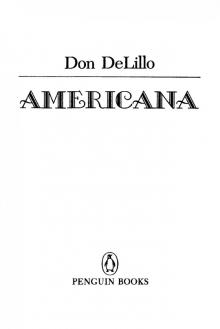 Americana
Americana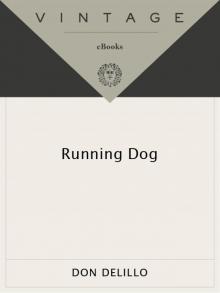 Running Dog
Running Dog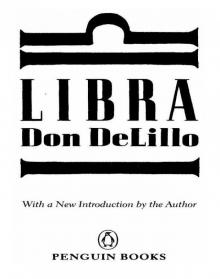 Libra
Libra End Zone
End Zone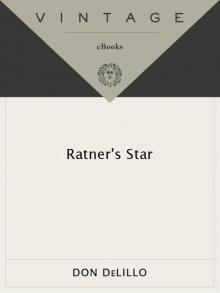 Ratner's Star
Ratner's Star Underworld
Underworld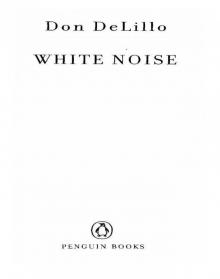 White Noise
White Noise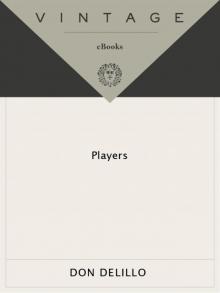 Players
Players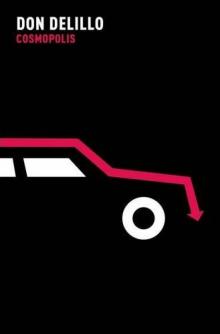 Cosmopolis
Cosmopolis The Silence
The Silence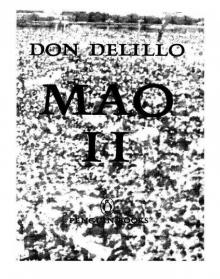 Mao II
Mao II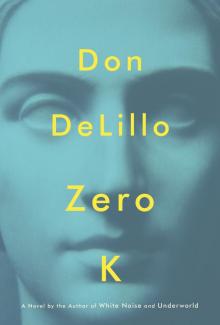 Zero K
Zero K Great Jones Street
Great Jones Street The Angel Esmeralda
The Angel Esmeralda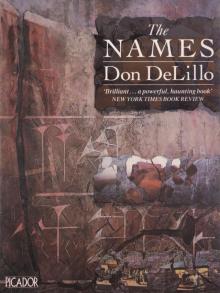 The Names
The Names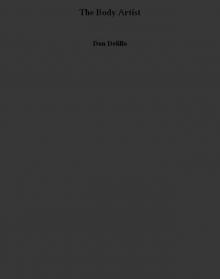 The Body Artist
The Body Artist Point Omega
Point Omega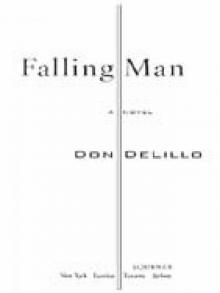 Falling Man
Falling Man